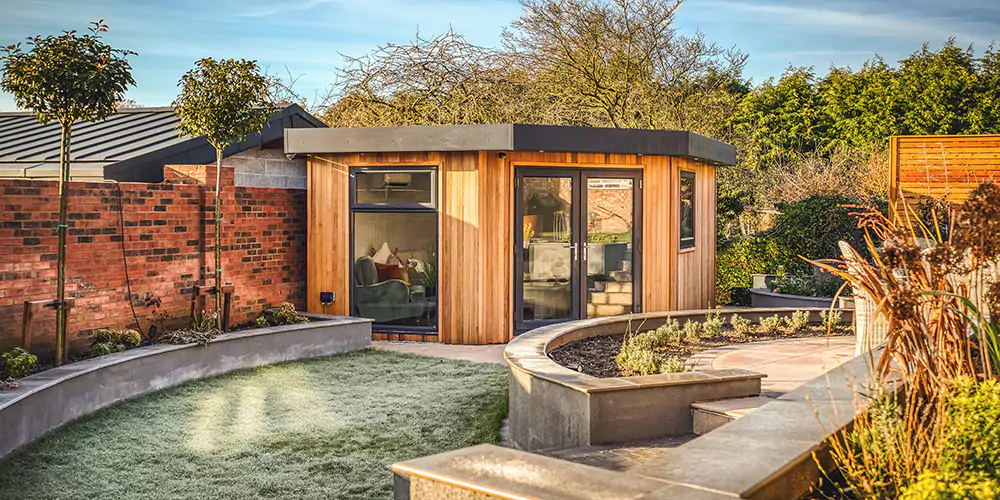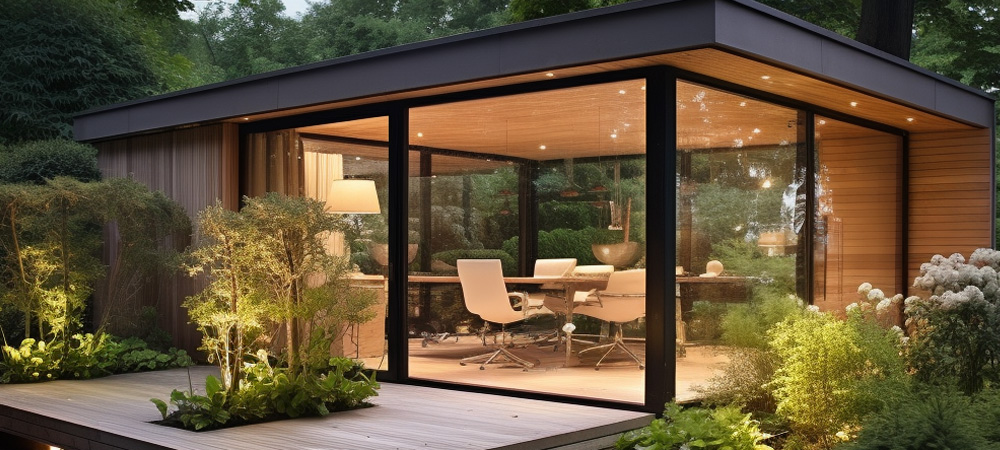Best Tips On Planning Permission For Garden Summer Houses
Wiki Article
What Type Of Planning Approval Will You Need To Change The Purpose Of Your Garden Space And So On.?
In determining if planning permission is required for garden rooms or conservatories, outhouses and garden offices or extensions, "change of use" or "change of the purpose" is a crucial role. Considerations for planning permission relating to a change in usage include changing from residential to non-residential use:
In most instances planning permission is required to convert non-residential buildings (such as garages and agricultural structures) into residential spaces or garden offices. This is because there could be a change in use class.
Garden Rooms as living spaces:
The use of a room within the garden as an independent living unit (e.g. guest house, rental unit) is considered a alteration of the use. It is essential to obtain planning permission in order to make sure that the building conforms to the requirements of residential living.
Business Use
If you plan to use the garden room, conservatory, or extension to conduct business (e.g., as an office space for an office-based business at home that has frequent visitors or employees) the planning permission might be required. This is due to the potential impacts on neighboring areas which includes noise, parking, and traffic.
Utilization for Community or Education:
Planning permits are required to permit the conversion of a garden structure into an educational or communal space (such an auditorium, classroom, meeting hall, or auditorium). The local authority evaluates the suitability of the site and its impact on surrounding areas.
Impact on local infrastructure:
Planning permission is required for any changes to use that will have a major impact upon local infrastructure. These impacts will be analyzed by the local planning authority as part of their application process.
Dual Use
Planning permission is required for properties with mixed-use (part residential, part commercial) to define and regulate clearly the different uses of the property.
Increased Footfall & Traffic
The local planning authority will need to accept the proposed change in the event that it could lead to an increase in footfall or traffic.
Building Regulations In compliance:
Although not strictly an issue planning permissions, any changes in use must adhere to building regulations for safety as well as health and energy efficiency standards. This is especially true when the space is converted to a habitable one.
Environmental Impact:
Planning permission is required for any modification in the use that may affect the natural environment. This includes converting agricultural land into residential property. Planning applications may contain an environmental assessment.
Community and Amenity Effect
The most important consideration is the impact of the plan on the local community and its culture. As an example, converting the garden space into a cafe would need planning permission to ensure it aligns with community plans and preserves local amenities.
Designated Areas
Changes in usage are strictly controlled in designated areas such as National Parks or Areas of Outstanding Natural Beauty. This is to preserve the character and appearance of these places. This is the reason why the need for planning permission is required.
Local Planning Policies
Local planning authorities usually have specific guidelines for changes of use. They can be very different. It is recommended to read these policies so you know what types of changes can be permitted and what requirements need to be met.
Summary A planning permit is required to make any significant change to the the use of an extension or conservatory, such as a garden room or conservatory. This ensures that the new usage is suitable for the location, complies with both national and local plans, and is able to address any potential negative impacts to the surrounding environment and the community. Consult with your local planning authority early in the planning process is vital to establish the precise requirements and obtain the necessary approvals. Take a look at the top rated cedar garden rooms for site tips including best heater for log cabin, garden outhouse, garden out house, luxury outhouse, garden room heater, garden room heater, copyright outhouse, outhouse uk, my outhouse, out house for garden and more.

What Permissions Are Needed For Garden Rooms As Well As Other Structures That Are Related To Neighbourhood Concerns?
In determining whether planning permission is necessary for the construction of a garden office, conservatories or gardens as well as outhouses and outhouses within the neighborhood, it's important to consider whether neighbors are worried. Two important factors to consider privacy and overlooking.
Planning permission could be required when the proposed construction may cause a loss of private space. It will guarantee that the structure will not negatively affect the lives of those within the vicinity.
Light loss and shadowing
A planning permit is usually required when a building will cause significant light loss or shadowing of nearby homes. The local planning authority assesses the impact on sunlight for adjacent homes.
Noise and Disturbance
Planning permits are required if the extension or room is used for any activity that causes noise (such as a home office with visitors, a workshop, music room, etc.). The level of noise must be within acceptable limits and should not disturb neighbors.
Visual Impact and Character
The new structure's design, size and appearance must be in keeping with the aesthetics of the neighborhood. Planning permission ensures the development is appealing to the eye and does not affect the beauty of the neighborhood.
Boundary Proximity
The construction of structures near the property boundary may need planning permission, especially those that are taller than 2.5 meters within 2 meters of the boundary. This is to avoid conflict and negative effects on neighboring properties.
Shared Access as well as Rights of Way
To ensure that shared access rights of way are not hindered or adversely affected by the construction, planning permission will be needed.
Objections by Neighbors
The right of consultation with neighbors is a fundamental aspect of the process of planning. Planning authorities take into consideration the objections of neighboring residents when deciding to grant permission.
Effect on the Value of Property
Planning permission is typically required when significant changes to the value of the houses around you are made. This might not be the sole reason however it could impact the decision. When making a decision the local authority must take into account the impact of these changes.
Covenants and Deed Restrictions
If you own an agreement or deed restriction on your property, it may oblige you to comply with them regardless of whether planning permission is granted. These agreements can affect the harmony of the neighborhood by dictating the type of building that can be constructed and what cannot.
Construction Disturbance:
Planning permission could be granted to address issues with disturbances in construction, like dust or noise. It might be necessary to set up conditions in order to reduce the impact on neighbouring properties.
Infrastructure Impact
If the new structure places more strain on infrastructure in the area (e.g. drainage or parking, roads, etc.) Planning permission will ensure that these impacts are assessed and managed appropriately.
Community Consultation:
In certain situations, a broader community consultation may be required, particularly for larger or more controversial projects. This enables the process to be more democratic, taking into account the opinions of the local community.
Summary: Concerns about the neighborhood's surroundings have a significant impact on the decision of whether to grant planning permission for garden offices, conservatories, outhouses or extension of the garden. It is crucial to ensure that the project is not a negative impact on the quality of life in the neighborhood and privacy and light, sound or the overall appearance. Early discussions with local authorities and interactions with neighbors can resolve these concerns. This will help facilitate an easier approval process. See the top rated composite garden office uk for blog examples including garden rooms in St Albans, garden room planning permission, best electric heater for cabin, what size garden room without planning permission, garden office electrics, garden rooms in St Albans, outhouse building, copyright garden buildings, garden rooms, do i need planning permission for a garden room with toilet and more.

What Kind Of Planning Approval Is Required For Your Garden, Rooms Or Other Areas.?
Planning permission is required to construct gardens, outhouses, or garden offices. The infrastructure and utilities are additionally important aspects to consider. Here are the most important aspects to take into consideration: Water Supply and Drainage:
A planning permit could be required for connecting an additional structure to water or drainage systems. The water authority in the area will have to assess whether the impact of the new structure on the water supply system and the sewage system is suitable.
Gas Connections and Electricity Connections
If the building is required to have connections to gas or electricity sources, planning permission could be needed. Compliance with building regulations and safety standards is essential to connect these lines.
Utility Easements
Planning permission could be required if the structure is situated in an area designated for utilities and infrastructure. It might be necessary for the local utility company to approve the construction of these areas.
Septic Tanks and Sewage Systems
Planning permission is required when the building is required to have an on-site septic tank or sewer treatment system. Conformity with environmental regulations as well as health standards is vital for these systems.
The Drainage System and Surface Water Management:
Planning permission could be required in order to manage the drainage issue and surface water runoff from the new structure. Measures to prevent erosion, flooding and water pollution may need to be implemented.
Access to Utilities for Construction
The planning permission may be needed for access to utilities that are temporary like water, for example, during construction. Temporary connections are subject to safety and environmental rules.
Local infrastructure impacts:
A planning permission is needed to assess the effect of an expansion on local infrastructure which includes utilities, roads as well as public services. Local authorities will determine whether the existing infrastructure is able to help support the new development.
Recycling and waste management:
Planning permission could include requirements for waste management as well as recycling after construction. To minimize environmental impact, there should have provisions in place for recycling and the disposal of waste.
Efficiency and Renewable Energy. Efficiency and Renewable Energy
Installing energy-efficient features and renewable energy systems within a new building (such as solar panels or heat pumps) could require planning permission. The codes for construction and environmental standards must be observed.
Telecommunications and Internet Connectivity
Planning approval is required for any new structures which require telecommunications or internet connections. In accordance with guidelines and standards regarding telecommunications infrastructure.
Access to the Footpath and Road:
For example, it may be necessary to get planning permission prior to being able to build or modify the footpath. For road and path construction, it is vital to meet the safety requirements.
Accessibility to Public Transport:
Planning permission may be required if the new structure has any impact on public transport (such as stops for buses or train stations). The public transport infrastructure must conform to standards and regulations.
The infrastructure and utilities are important factors that determine the need for planning permission. is required for garden offices, conservatories outhouses, garden rooms or outhouses. To ensure that all rules and standards are followed it is essential to consult the local planning authority early in the stage of the planning process. Read the most popular garden ware for blog examples including copyright garden room, outhouse garden, garden rooms brookmans park, outhouse garden, garden room permitted development, garden office electrics, out house, outhouses for garden, insulated garden buildings, garden rooms near me and more.
